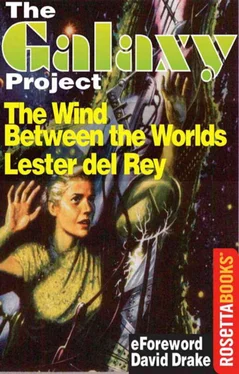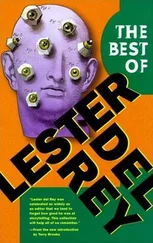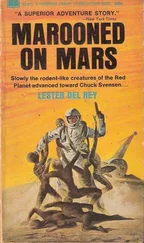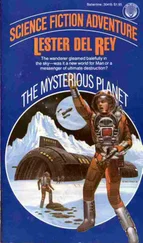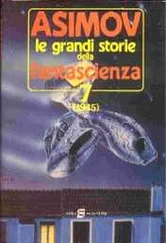“Tomorrow, hell! In two hours they’re sending over straight blockbusters, radar-controlled all the way. No atomics—yet—but they’re jumping the gun, anyhow. Some nut convinced Wilkes that an ordinary eight-ton job might just shake things enough to fracture the glass that’s holding the short. And Pan-Asia is going completely wild. I’ve been talking to Wilkes. The people are scared silly, and they’re pressuring for quick war.”
Vic nodded reluctantly and reached for the benzedrine he’d hoped to save for the last possible moment, when it might carry him all the way through. What difference did it make? Even if he had an idea, he’d be unable to use it.
“And yet…” He considered it more carefully, trying to figure percentages. There wasn’t a chance in a million, but they had to take even that one chance. It was better than nothing. “It might just work—if they hit the right spot. I know where the glass is, and the layout of the station. But I’ll need authority to direct the bombs. Flavin, can you get me President Wilkes?”
Flavin shrugged, reached for the televisor. He managed to get quite a way up by some form of code, but then it began to be a game of nerves and brass. Along his own lines, he apparently knew his business. In less than fifteen minutes, Vic was talking to the President. For a further few minutes, the screen remained blank. Then another face came on, this time in military uniform, asking quick questions, while Vic pointed out the proper targets.
Finally the officer nodded. “Good enough, Peters. We’ll try it. If you care to watch, you can join the observers. Mr. Flavin already knows where they are. How are the chances?”
“Not good. Worth trying.”
The screen darkened again, and Flavin got up. The thing was a wild gamble, but it was better to jar the building than to melt its almost impregnable walls. Even Betz II metal couldn’t take a series of hydrogen bombs, though nothing else could hurt it. And with that fury, the whole station would go.
They picked up Pat, and moved out to Flavin’s car. Vic knew better than to try to bring Ptheela along. As an alien, she was definitely taboo around military affairs. The storm had reached the city now, and dense clouds were pouring down thick gouts of rain, leaving the day as black as night. The car slogged through it, until Flavin opened the door and motioned them out into a temporary metal shelter.
Things were already started. Remote scanners were watching the guided missiles come down, and eyes were operating in the bombs, working on infra-red that cut through the rain and darkness. It seemed to move slowly on the screen at first, but picked up apparent speed as it approached the transmitter buildings. The shielding grew close, and Pat drew back with an involuntary jerk as it hit and the screen went black. Dead center.
But the remote scanners showed no change. The abrupt break in the air-motion where the transmitter field began, outside the shielding, still showed. Another bomb came down, and others, each spaced so as to hit in time for others to be turned back, if it worked. Even through the impossible tornado of rotating fury, it was super-precision bombing.
The field went on working just the same, far beyond the shielding, pulling an impossible number of cubic feet of air from Earth every second. They stopped watching the screen shown by the bomb-eyes at last, and even the Army gave up.
“Funny,” one observer commented. “No sound, no flash when the bombs hit. I’ve been watching the remote scanners every time instead of the eye, and nothing happens. The bombs just disappear.”
Pat shook herself. “They can’t hit. They go right through the field, before they can hit. Vic, it won’t matter if we do atom-bomb the station. It can’t be reached.”
But he was already ahead of her. “The Ecthindar will love that. They’ve already been dosed with chemical bombs. Now guess what they’ll do.”
“Simple.” It was the observer who got that. “Start feeding atom bombs into their transmitters back to us.”
Then he shouted hoarsely, pointing through a window. From the direction of the station, a dazzle of light had lanced out sharply, and was now fading down. Vic snapped back to the remote scanner, and scowled. The field was still working; there was no sign of damage to the transmitter. If the Ecthindar had somehow snapped a bomb into the station, it must have been retransmitted before full damage.
The Army men stared sickly at the station, but Vic was already moving toward the door. Pat grabbed his arm, and Flavin was with them by the time they reached the waiting car.
“The Bennington office,” Vic told the driver. “Fast! Somebody has to see the Ecthindar in a hurry, if it’ll do any good.”
“I’m going, too, Vic,” Pat announced. He shook his head. “I’m going,” she repeated stubbornly. “Nobody knows much about Ecthinbal or the Ecthindar. You call in Code messages, get routine Code back. We can’t go there without fancy pressure suits, because we can’t breathe their air. And they never leave. But I told you I was interested in races, and I have been trying to chit-chat with them. I know some things. You’ll need me.”
He shook his head again. “It’s enough for one of us to get killed. If I fail, Amos can try, or Flavin. If they both fail—well, suit yourself. It won’t matter whether they kill me there or send through bombs to kill me here. But if one of us can get a chance to explain, it may make some difference. I don’t know. But it may.”
Her eyes were hurt, but she gave in, going with him silently as he stepped into the local Bennington unit and stepped out in Chicago, heading toward the Chicago Interstellar branch. She waited patiently while the controlmen scouted out a pressure suit for him. Then she began helping him fasten it and checking his oxygen equipment. “Come back, Vic,” she said finally.
He chucked a fist under her chin and kissed her quickly, keeping it casual with a sureness he couldn’t feel. “You’re a good kid, Pat. I’ll sure try.”
He pulled the helmet down and clicked it shut before stepping into the capsule and letting the seal snap shut. He could see her swing to the interstellar phone, her lips pursed in whistled code. The sound was muffled, but the lights changed abruptly, and her hand hit the switch.
There was no apparent time involved. He was on Ecthinbal, looking at a faintly greenish atmosphere, noticeable only because of the sudden change, and fifty pounds seemed to have been added to his weight. The transmitter was the usual Betz II design, and everything else was familiar except for the creature standing beside the capsule.
The Ecthindar might have been a creation out of green glass, coated with a soft fur, and blown by a bottlemaker who enjoyed novelty. There were two thin, long legs, multijointed, and something that faintly resembled the pelvis of a skeleton. Above that, two other thin rods ran up, with a double bulb where lungs might have been, and shoulders like the collar pads of a football player, joined together and topped by four hard knobs, each with a single eye and orifice. Double arms ran from each shoulder, almost to the ground.
He expected to hear a tinkle when the creature moved, and was surprised when he did hear it, until he realized the sound was carried through the metal floor, not through the thin air.
The creature swung open the capsule door after some incomprehensible process that probably served to sterilize it. Its Galactic Code whistle came through Vic’s shoes from the floor. “We greet you, Earthman. Our mansions are poor, but they are yours. Our lives are at your disposal.” Then the formal speech ended in a sharp whistle. “Literally, it would seem. We die.”
Читать дальше
